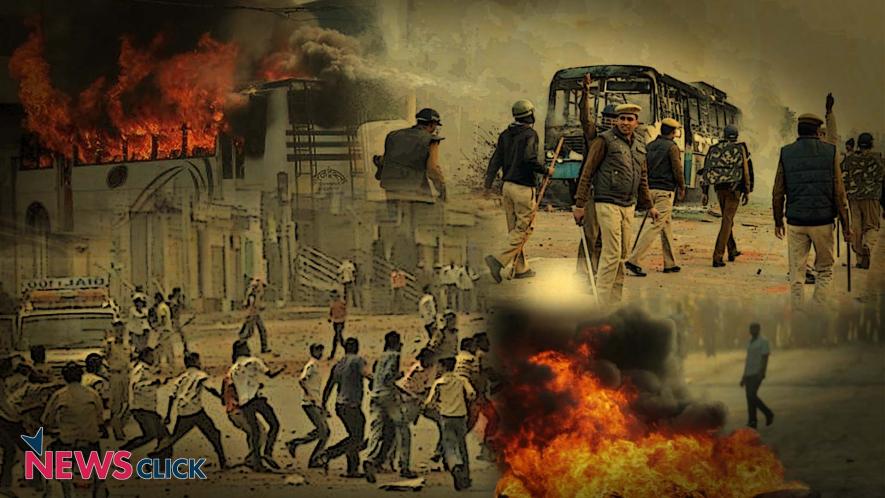Rising Vigilantism: Civil Society Fails to Engage With Silent Majority?

Newsclick Image By Sumit
New Delhi: After every incident of mob lynching, a video emerges showing a person being thrashed by few people in the name of religion and mostly false accusations, and a large number of people watching as a mute spectator or filming the incident instead of trying to intervene. At a time, when the country appears to be divided on communal lines and increasingly becoming a majoritarian state, the efforts to bridge the growing divide between the majority and minority communities seem to be missing.
Except condemning the incidents of mob violence and holding the government/ruling parties/Opposition/police responsible for increasing number of hate crimes, which largely have a pattern of religious bias, both community and civil society organisations appear to have failed to reach out to the silent majority of those villages where incidents of hate crimes have occurred. There seems to be no effort aimed at shaking hearts to awaken humanity in them. They are humans and they must have heart.
Other than talking about secularism, inclusivity and diversity among elites of big cities, no organisation is visibly coming out of their comfort zones and doing something on the ground – in villages, qasbas, towns and cities – to strengthen peace, communal harmony and brotherhood in the society.
Though there are efforts – such as ‘Know Your Neighbour’, ‘Visit Our Mosques’, etc. – aimed at bridging the widening gap between the communities, they are so small that they go unheard.
Madhuri Katti, a physics teacher, a freelance writer and a volunteer of ‘Know Your Neighbour’ campaign, said the social campaign was started in South Kolkata a couple of years ago. It is mainly focusing on bringing communities together. “We share food and stories, etc. It is an attempt to create a platform for communities to interact so that trust can be built. We organise interfaith programmes like we did in Ramazan when people broke their fast together. We had invited people from all walks of life to join and witness the process of breaking fast so that they can understand how hunger and fast is related to the Islamic culture. Such events are in fact aimed at identifying each other and removing misconceptions from the society,” she told NewsClick.
Also read: Mob Lynching Can’t be Tackled Without Taking on Brahminism
Explaining the vision behind the campaign, she said that with such efforts people can identify the communities better, and hatred and misconceptions go down. “We had held a story-telling session with children. We asked them to bring their own food. Children from different religions brought different food items. This food was kept together and then there were story-telling and drawing sessions. In the end, everyone had different kind of food brought by children belonging to different communities in one plate. There was no differentiation. Children don’t differentiate between communities. Parents too did not ask their kids what to eat and what not. We wanted to break the myth that people cannot be brought together and inclusiveness still exists. Unfortunately, a narrative is being set to break that inclusiveness,” she said, adding that, “we just want to celebrate our diversities and tell people that it is something that should be celebrated. Inclusiveness is there and it is inherent in our culture. We should not let others destroy it so easily.”
On being asked why the silent majority witnessing cases of hate crimes do not intervene, she said it is due to “fear” as the “perpetrators enjoy political patronage”. “If one person stands up, the courage starts coming in. He will surely be joined by people who will resist. We observed this when we launched our campaign. Once we started it, we got tremendous support. It was a first time experiment for many of and they told us that they were hesitant but now they are glad,” she shared.
There is a dire need to take forward such initiatives into the interiors of the country. “We launched this campaign from Khidirpur, which is located in the central-west part of the city. It has high population of interfaith people. People from North Kolkata or South Kolkata hardly go there. When we started talking to college students about the area, the culture, they admitted that they didn’t know anything about the area. They don’t know Wajid Ali Shah, the 10th and last Nawab of Awadh, is buried here. There is a huge misconception – based on the stereotyping that happen in movies – that the area is mini Pakistan and one should not be going there. We encourage people to come over there. When they started coming in, they realised that the reality is completely different. People here, too, want to have a normal life. We purposely started our campaign from here and made people visit the area so that they realise that there is no exclusion. People are isolated for no reason,” she added.
It is an unfortunate fact that there are geographic divisions based on religion, she said, adding that “You will find pockets across the cities in the country. We are trying to break it. We are trying to take the elitist crowd to the interiors.”
However, since the campaign has limited number of volunteers, it cannot launch it nationwide. “If such efforts are replicated across the country, it would be wonderful. I am sure that it would yield results if people take it up as a movement,” she hoped.
Dr Manzoor Alam, chairperson of a Delhi-based think tank – Institute of Objective Studies (IOS), said the IOS started a dialogue with top leaders of the majority community for religious understanding and it is having many future programmes on the same issue.
“We are appealing people in general to come out and take up issues so that peace in the society can be restored on the basis of the Constitution as well as teachings of religions as all religions stand for peace, progress and prosperity. There will be no progress unless peace is prevailing,” he said, and urged Muslims to come out and take steps without caring whether there is any step being taken by the other side.
Also read: ‘Jai Shri Ram’ Slogan Is Pure Politics, Doesn’t Sync with Rama’s Character: Sankat Mochan Priest
Holding the government and the ruling dispensations responsible for “promoting” an atmosphere of hate across the country, he said, “The Supreme Court had given a detailed guideline to be adopted to curb the cases of lynching across the country. It was the responsibility of the government to work on the directions and take initiatives. It is totally a failure on part of the government. Their leaders use such words day in and day out which give a kind of encouragement to the perpetrators and a sense of impunity.”
Adding that any country that wants to develop have to ensure two things – respect of the law and fear of the law, he also appealed to top Hindu religious leaders to come forward and take steps to “protect the dignity of humanity” and to ensure that diversity of the country is protected.
On being asked if he thinks that interfaith dialogues should be held at local levels instead of conference halls in big cities, he lamented, “It is impossible to reach out to everyone without the support of the mass media. Unfortunately, we do not get media coverage whenever we organise such campaigns.”
NewsClick also approached Jamaat-e-Islami Hind (JIH) – a well-known Muslim organisation with presence in the interiors of the country – to find out what steps they are taking to address the problem? “The Jamaat-e-Islami Hind, since the beginning, have visited the villages where hate crimes have taken place. We not only met Muslims, but non-Muslim population of the area. In Dadri where Akhlaq was lynched, I myself as part of a delegation met the Pradhan (village head) and spoke to non-Muslims who admitted this incident should not have happened. I still remember that a marriage ceremony, which was postponed because of the disturbance there, was rescheduled and the Hindus of the area participated in it and extended help to the family in arranging the marriage,” Engineer Salim, vice president of the JIH, told NewsClick.
After such incidents began taking place, he claimed, his organisation launched a nationwide campaign in 2016 at the village level where they organised small meetings and invited people from different faith. “We constituted ‘Sadbhawna Manch’ at local level across the country. At present, 1,000 Sadbhawna Manch are functioning across the country. We also have plans to extend it to larger areas in the next four years. This is a very significant programme of the JIH. Our central as well as state leaderships are very-well engaged in promoting communal amity,” he said.
But Tanweer Alam, a University of Oxford scholar and columnist, feels that there is a failure on the community side. “We are at the receiving end, still there is hardly any effort to have an engagement with the majority community. There is definitely a trust deficit which must be addressed. The argument that minorities are the victims and therefore, it is responsibility of the majority community to ensure safety of minorities is true, but we must understand that we are at the receiving end, they are not.”
Also read: Today ‘Jai Sri Ram’ Has Become A Provocative ‘War-Cry’, 49 Celebs Write Open Letter To PM Modi
Nadeem Khan, volunteer of a campaign called United Against Hate – which works against hate crimes, also shared Alam’s views. “All Muslim organisations as well as Hindu religious groups have measurably failed to remove misconceptions about each other. The Muslims clergy class lacks any orator who can reach out to the other community. They can only sermonise the Muslim community in their difficult Urdu,” he said.
He said there are efforts to reach out to the majority community but these are not sufficient given the quantum of hatred and misconceptions on the ground. “What is needed is efforts on a war footing to reach out to the communities to curb this hysteria before it is too late,” he added.
The problem is “deep rooted”, says DK Singh, associate professor at the Department of Law, Bareilly College, Uttar Pradesh, accepting that the country has been “divided on religious lines”. “And therefore, when the prime minister (Narendra Modi) says this hysteria must stop and gives a call of Sabka Saath, Sabka Vikas, Sabka Vishwas (together with all, development for all, confidence of all), it does not have any impact on the ground because the ground-level workers are apparently not ready to listen to him. They take the PM’s words against them and against Hindutva,” he said.
“People are spoon fed day and night with venomous and false information about the minority community through social media. False and inflammatory messages are spread systematically with an aim to create divide in the society. On the other hand, there is no substantive efforts to counter the propaganda, which is widely believed by people,” he alleged.
Also watch: We Are Surrounded by Jai Shri Ram, Lynchings and UAPA
Asked about the solutions and efforts taken so far, he said, “The damage has already been done. It is only the RSS (Rashtriya Swayamsevak Sangh) which can do something more effective to tackle the menace as they have grassroots presence across the country. If the message of Sabka Saath, Sabka Vikas, Sabka Vishwas comes from the RSS, it will surely have an impact on the ground. They must come forward in the interest of nation and to protect the diversity and inclusivity of the country.”
Get the latest reports & analysis with people's perspective on Protests, movements & deep analytical videos, discussions of the current affairs in your Telegram app. Subscribe to NewsClick's Telegram channel & get Real-Time updates on stories, as they get published on our website.
























